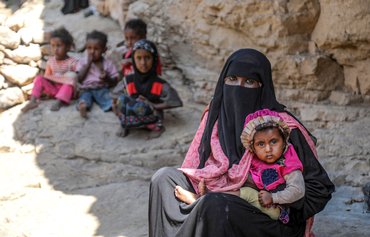Iran's Islamic Revolutionary Guard Corps (IRGC) has supported Yemen's Houthis (Ansarallah) since the militia's emergence in the early 1990s in the northern province of Saada, experts told Al-Mashareq.
From the outset, they said, the IRGC intended to use the Houthis as a proxy force to upset the balance of power in the region, due to the militia's strategic location near Saudi Arabia's southern border.
The IRGC's arms shipments to the Houthis, along with trainers to teach them how to assemble and use them, implicate Iran in the Houthis' attacks against neighbouring countries and have extended the war in Yemen, they said.
In April 2018, the Abaad Centre for Studies and Research published a study in which it revealed that Houthi leader Abdul Malek al-Houthi's father, Badr al-Din al-Houthi, had lived in Tehran for several years.
He was influenced by Iran's first Supreme Leader, Ruhollah Khomeini, and the Iranian model, the study said, noting that his son, Hussein Badr al-Din al-Houthi, had also travelled to Iran in the mid-1980s.
'Direct relationship with Iran'
The Houthis have a direct relationship with Iran, as evidenced by the militia's mid-August announcement it was appointing its own "ambassador to the Republic of Yemen" in Tehran, in violation of international law.
Before this, and before the Houthis' coup of 2014, Abaad Studies and Research Centre director Abdulsalam Mohammed said, the Iranian ambassador to Sanaa used to visit Houthi areas in Saada.
Through the Iranian ambassador's visits to these areas, ostensibly to hand out "academic scholarships" for students to study in Iran, the IRGC gained access to Houthi youth, he told Al-Mashareq.
These young men were brought to Iran, where they were provided with military, political and media training, he said.
By the late 1990s, Iran had been able to establish various institutions and centres in Yemen, and was able to infiltrate some state institutions and the ruling General People's Congress, he said.
It also formed an ideological cell that recruited youth, which gained prominence after the start of Yemen's wars with the Houthis in 2004, Mohammed said.
"Since the first war, Iran has been providing logistical and military support through the recruits trained by the IRGC and Hizbullah under the heading of 'academic scholarships'," he said.
This led to the establishment of ammunition and explosives manufacturing plants in Saada, he added, noting that this would not have been possible without the involvement of IRGC and Hizbullah experts.
Mohammed pointed in particular to the training provided inside Iran.
This reveals the Iranian regime's "determination to form a military force that seizes control of Yemen, and has it serve as a springboard for threatening neighbouring countries and international interests", he said.
IRGC trains Houthi fighters
The IRGC has been directly involved in training the Houthis' elite forces, according to a May 2015 report by the Strategic Fikr Centre for Studies.
The report identified the Army of Hussein as the nucleus of the Houthis’ elite forces, saying the force received training from the IRGC.
The training was conducted in two phases, the report said, with the first session, in 2011 and 2012, focused on high and middle-tier commanders.
This training took place in Lebanon, Damascus and Tehran, the report said.
The second phase was conducted in the Houthis' camps in Saada, the report revealed, with cadres from Hizbullah and the IRGC taking part in the training.
"The IRGC began its training of Houthi elements by recruiting students to study in Iran," armed group researcher Nabil al-Bakiri told Al-Mashareq.
When the situation in Yemen escalated into clashes with the army, the IRGC dispatched military experts to Houthi areas under various pretexts, he said, noting that the IRGC has expanded its military training significantly since 2011.
The IRGC has been overseeing the Houthis' military development since around 1990, through its involvement in training and recruitment operations, political analyst and journalist Faisal Ahmed told Al-Mashareq.
It also has been engaged in the smuggling of weapons to the Houthis, as well as the provision of unmanned aerial vehicle (UAV) technology and training, he said.
The Houthis have used these weapons and drones to threaten Saudi Arabia, he added, by launching attacks against civilian airports and oil installations.
This "makes Iran directly responsible for the damage caused to Saudi Arabia by the Houthi attacks, as well as the suffering of millions of Yemenis brought on by the war ignited by the Houthis", he added.

![Yemeni men chant slogans as they hold up Kalashnikov assault rifles during a tribal meeting in Houthi-held Sanaa on September 21st. [Mohammed Huwais/AFP]](/cnmi_am/images/2019/10/15/20290-Yemen-Sanaa-Houthis-600_384.jpg)







Iran should provide Houthis with free weapons and help them against the Western terrorists. Long Live Iran
Reply2 Comment(s)
As a result of the fast pace of events, Houthis revolted against the unjust regime and seized control of Sana'a and several provinces with Houthi majority. Then Saudi Arabia and UAE militarily intervened, entered Yemeni soil and occupied Aden and other provinces with the support of takfiri groups. They waged an unjust and unequal war on the South, with the aggressors launching air strikes that targeted infrastructure, and blocking foods from reaching hundreds of thousands of people who are now living under siege, disease and starvation. Then the Islamic Republic of Iran provided modest support in view of the land, sea and air siege on Yemen. The besieged people of Yemen are now suffering from disease, hunger, displacement, and destruction at the hands of the barbaric forces of injustice represented by the Saudi and Emirati killing machine and mercenaries from here and there. These unjust forces did everything, destroyed stones, killed people, and violated Islamic, moral and humanitarian sanctities. Then the people started to defend their land and honour, sacrificing everything and responding to Saudi crimes with drone attacks on oil facilities and other areas more than once to respond to this aggression. As a result of these successful and effective strikes, Saudi Arabia started to accuse Iran of being behind the attacks.
Reply2 Comment(s)